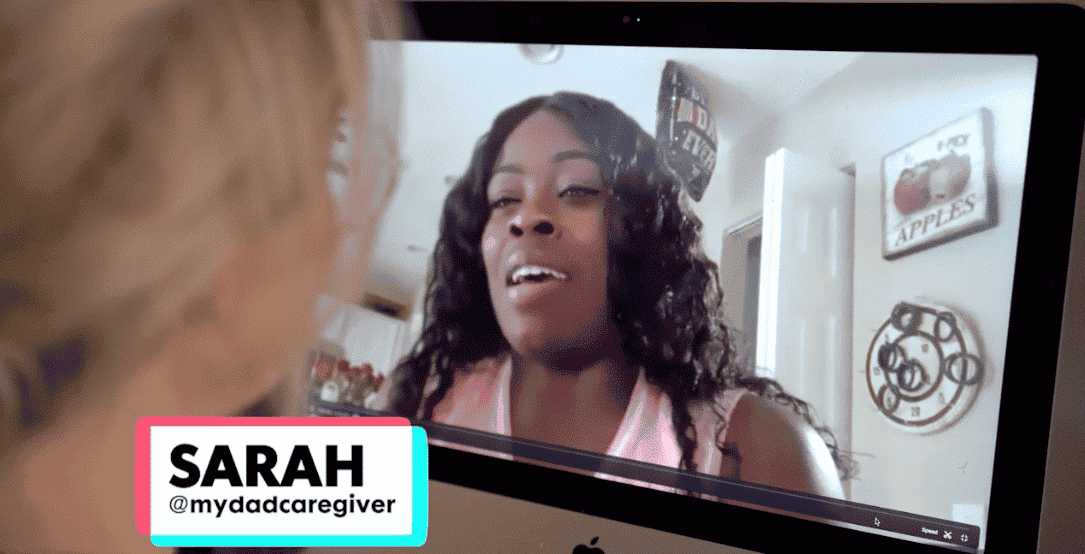Do You Have #TimeToCare?

Our sneak peek screening of producer Ky Dickens’ latest film, #TimeToCare, was fabulous! More than 60 viewers joined from across the country to watch the 20-minute documentary about paid leave going viral. All four of the film’s stars and the filmmaker joined for a talkback.
The discussion highlighted the need for a broader definition of caregiving. Josie Kalipeni, FV@W’s deputy director who moderated the conversation, pointed out that the majority of workers actually use paid family and medical leave for non-pregnancy care. The top reason people take leave is to care for their own serious medical condition. “And many of us are going to be caregivers for aunties, mothers- and fathers-in-law or our own parents,” Josie said.
Sarah Clements, one of the TikTokers featured in the film, agreed. As the sole caregiver for her father, she worries that she won’t be able to find a job that offers paid leave once she completes her Masters program.
“A couple of weeks ago my father contracted COVID from one of the care aides that came to see him.,” she said. Her father is currently in the hospital and stable. “I know that the care I have to give him is going to be a lot more than it was before. “I am concerned about going to work after I graduate because there aren’t a lot of corporate jobs that offer paid leave. [Affordable leave] is something that everyone should have as caregivers because anyone could need care in the blink of an eye.”
Sarah makes a bold point: You shouldn’t have to win the boss lottery to be able to have time to care — a statement coined by our co-founder, Ellen Bravo, that still rings true. At some point in our lives, we’re all going to have to give or receive care. Whether we can afford to do it––both financially and psychologically––will depend on Congress passing a universal and equitable paid leave program.
How to influence Members of Congress to prioritize paid leave? Filmmaker Ky Dickens told viewers the best way is by sharing our stories.
“Stories are really the foundation of activism, and activism is the foundation of policy,” Ky said. “You can’t activate anyone without stories; you must be able to put a face to an issue.”
Lydia Delgado, who is expecting her first child, expressed awe at the response to her TikTok videos, both the support for her and the sharing by hundreds of commenters who also had to have a baby with no paid leave.
“Many of the people who left comments on my videos worked in schools, hospitals, lots of first responders. I think when they saw my TikToks, they felt seen, they felt heard, and [they felt] how I felt, like ‘Maybe I’m not alone.’”
Grant Khanbalinov’s experience confirms that social media activism can raise awareness at critical moments in people’s lives. A veteran whose wife had no paid leave when he underwent major surgery, Grant has also become an advocate for servicemembers considering suicide.
“Being a mental health advocate for the military, I got to experience a lot of situations where a servicemember was having a mental health emergency,” Grant said. “They go through their treatment and then they’re sent home. And anyone who’s had a mental health emergency knows that being alone with your thoughts during that time is one of the scariest things you can imagine. These servicemembers would say, ‘I wish my mom could be here. I wish my dad could be here, or my sister or brother, aunt or uncle, or whoever.’ Yes you have amazing professionals that help you when you’re at the doctor’s office, but you still need that connection at home. That’s why to me paid leave is super important.”
Tameka Henry, another of the stars from the film, echoed that sentiment, and encouraged everyone touched by their posts and the film to be moved to action.
“Rally around [the paid leave] issue and advocate for it; ring the alarm,” said Tameka. “Write your Members of Congress and let them know how important it is for Paid Family Medical Leave to be passed. It’s something we needed prior to the pandemic, for my family and so many others. Care can’t wait. Everyone is going to be affected by this at one time or another, whether it’s caring for a loved one, or having someone care for you. Hold our elected officials accountable and share our stories. Collectively we can bring change. ”
The urgency of the issue has been exacerbated during the pandemic. “COVID is the moment that everyone’s eyes opened to the crisis of care,” Josie said.
The discussion reminded us that we’re on the cusp of historic change — and we are the ones who will make that happen.